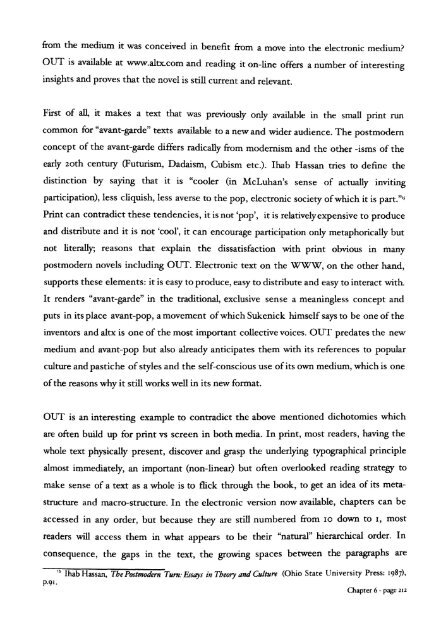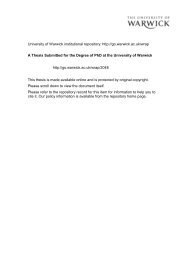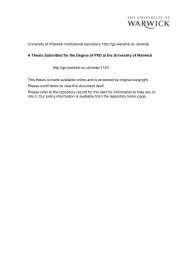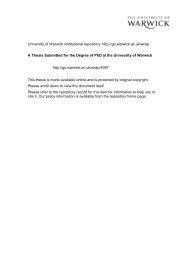From Page to Screen - WRAP: Warwick Research Archive Portal ...
From Page to Screen - WRAP: Warwick Research Archive Portal ...
From Page to Screen - WRAP: Warwick Research Archive Portal ...
You also want an ePaper? Increase the reach of your titles
YUMPU automatically turns print PDFs into web optimized ePapers that Google loves.
from the medium it was conceived in benefit from a move in<strong>to</strong> the electronic medium?<br />
OUT is available at www.altx.com and reading it on-line offers a number of interesting<br />
insights and proves that the novel is still current and relevant.<br />
First of all, it makes a text that was previously only available in the small print run<br />
common for "avant-garde" texts available <strong>to</strong> a new and wider audience. The postmodem<br />
concept of the avant-garde differs radically from modernism and the other -isms of the<br />
early zoth century (Futurism, Dadaism, Cubism etc.). Ihab Hassan tries <strong>to</strong> define the<br />
distinction by saying that it is "cooler (in McLuhan's sense of actually inviting<br />
participation), less cliquish, less averse <strong>to</strong> the pop, electronic society ofwhich it is part.?"<br />
Print can contradict these tendencies, it is not 'pop', it is relative1yexpensive <strong>to</strong> produce<br />
and distribute and it is not 'cool', it can encourage participation only metaphorically but<br />
not literally; reasons that explain the dissatisfaction with print obvious in many<br />
postmodern novels including OUT. Electronic text on the WWW, on the other hand,<br />
supports these elements: it is easy <strong>to</strong> produce, easy <strong>to</strong> distribute and easy <strong>to</strong> interact with.<br />
It renders "avant-garde" in the traditional, exclusive sense a meaningless concept and<br />
puts in its place avant-pop, a movement ofwhich Sukenick himself says <strong>to</strong> be one ofthe<br />
inven<strong>to</strong>rs and altx is one of the most important collective voices. OUT predates the new<br />
medium and avant-pop but also already anticipates them with its references <strong>to</strong> popular<br />
culture and pastiche ofstyles and the self-conscious use ofits own medium, which is one<br />
ofthe reasons whyit still works well in its new format.<br />
OUT is an interesting example <strong>to</strong> contradict the above mentioned dicho<strong>to</strong>mies which<br />
are often build up for print vs screen in both media. In print, most readers, having the<br />
whole text physically present, discover and grasp the underlying typographical principle<br />
almost immediately, an important (non-linear) but often overlooked reading strategy <strong>to</strong><br />
make sense of a text as a whole is <strong>to</strong> flick through the book, <strong>to</strong> get an idea of its meta<br />
structure and macro-structure. In the electronic version now available, chapters can be<br />
accessed in any order, but because they are still numbered from 10 down <strong>to</strong> I, most<br />
readers will access them in what appears <strong>to</strong> be their "natural" hierarchical order. In<br />
consequence, the gaps in the text, the growing spaces between the paragraphs are<br />
15 Ihab Hassan, ThePostmodem Turn: Essays in Theory and Culture (Ohio State University Press: 1987),<br />
P·9I.<br />
Chapter 6 - page 212





